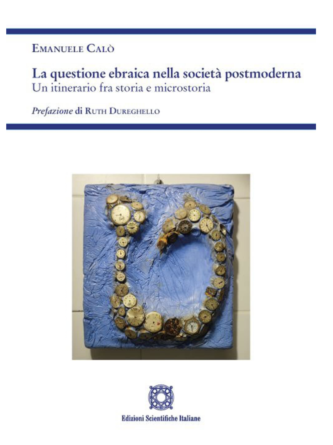The Jewish Question, between history and microhistory
 Historian and partisan Marc Bloch, one of the greatest intellectuals of the 20th century, wondered: “In order to act reasonably, isn’t it necessary to understand first?”. This is the question we find in the epigraph of the new book “La questione ebraica nella società postmoderna” (The Jewish Question in post-modern society) with subtitle “Un itinerario tra storia e microstoria” (An itinerary between history and microhistory), written by Emanuele Calò, jurist and director of the Enzo Sereni Observatory. Published by Edizioni Scientifiche Italiane, the volume takes up the challenge of delving into a clearly complex topic, going “beyond the sphere of the costume and of the single episode”. A commitment to which Calò is passionately dedicated, exploiting both his legal knowledge and his abilities as careful observer of Italian Judaism and of Israeli society.
Historian and partisan Marc Bloch, one of the greatest intellectuals of the 20th century, wondered: “In order to act reasonably, isn’t it necessary to understand first?”. This is the question we find in the epigraph of the new book “La questione ebraica nella società postmoderna” (The Jewish Question in post-modern society) with subtitle “Un itinerario tra storia e microstoria” (An itinerary between history and microhistory), written by Emanuele Calò, jurist and director of the Enzo Sereni Observatory. Published by Edizioni Scientifiche Italiane, the volume takes up the challenge of delving into a clearly complex topic, going “beyond the sphere of the costume and of the single episode”. A commitment to which Calò is passionately dedicated, exploiting both his legal knowledge and his abilities as careful observer of Italian Judaism and of Israeli society.
Divided into four sections, his reflections cover interconnected questions and worlds, with the idea that there is still much to say: “The Jewish question”, “Zionism and anti-Zionism”, “The Holocaust”, “Israel, Palestine and anti-Semitism”. The topics on which Calò focuses his attention are manifold, and they start from a careful study of the documents, such as the infamous papal bull “Cum nimis absurdum”, from which sprang, in 1555, the establishment of a Ghetto in Rome.
Or, along the same line, the Edict on Jews which was issued two centuries later by Pius VI. This is a real “code of denial of human dignity” that heavily conditioned the lives of the Jews in Rome until they were granted full rights and freedom in 1870, with the defeat of the Pope King before the royal army. These are historical junctions with which it is necessary to deal on the path that would lead from Emancipation to a new regime and a new persecution (at first of rights and then of lives): the great “betrayal” of Fascist Italy.
Italian antisemitic racism had a relevant characteristic among the others, underlines Calò. They wanted “the victim to thank the aggressor”, writes the author, recalling that Mussolini, during his speech delivered in Piazza Unità d’Italia in Trieste in September ’38, argued that “the world should perhaps be more surprised by our generosity than by our rigor”. The Left and the Jews, the de-Judaization of Christianity, the different inclinations of Zionism, the Arabic-Israeli conflict, the Jewish condition in Arabic or Islamic countries, the relationship between the State of Israel and the Jewish Diaspora. More, the poisons fed into the society by the BDS Movement, Italian legislation on antisemitism, the definition of the International Holocaust Remembrance Alliance. Calò writes about this and much more in his book, with an extensive bibliography aimed at stimulating new research and new insights.
Translated by Laura Cattani and revised by Sofia Busatto, students at the Advanced School for Interpreters and Translators of the University of Trieste, interns at the newspaper office of the Union of the Italian Jewish Communities – Pagine Ebraiche.
